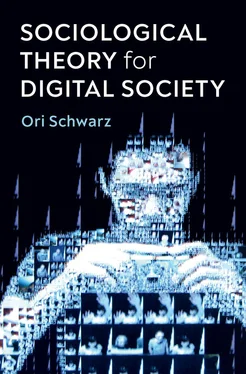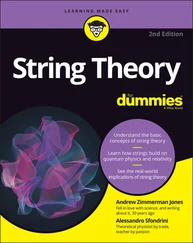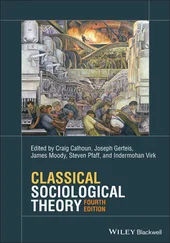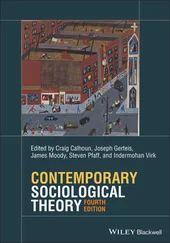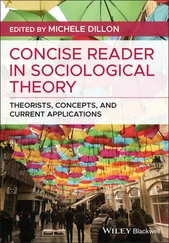1 Introduction:Old disciplines, new times, revised theories
The introduction of digital technologies into an ever-growing number of social institutions, practices and routines over the last few decades has reshaped social relations, structures and dynamics across social spheres in various ways. New patterns of sociality emerge with new forms of structure and agency. These changes surely deserve empirical research, and indeed enjoy much research attention in sociology (often under the title of ‘digital sociology’) and adjacent disciplines. But do they make an appropriate topic for a sociological theory book? One may have legitimate doubts. After all, Sociological Theory (not to be confused with ‘theories’ in the plural and more humble sense, ad hoc explanations for particular empirical phenomena) supplies sociologists with the conceptual tools, categories of thought and postulates without which we cannot even start representing social reality and making sense of it. Too often sociological theory debates are conducted as if these tools predated concrete social realities and have nothing to do with their changing.
The core questions of sociological theory are so abstract and fundamental they seem timeless and beyond time: questions of ontology; the choice of units of analysis; temporality; social action and its motives; power, causality and social change; structure and agency; knowledge and epistemology. It has never been possible and never will be to study social life, explain it, or even humbly describe it without first answering these timeless questions, explicitly or implicitly. This simply cannot be done without choosing units of analysis and making certain assumptions about their relations, the ways they can be studied, and how they may interact and change. Every sociology student is familiar with these eternal oppositions that every theory must address and overcome in its own way: micro and macro, agency and structure, consensus and conflict, materialism and idealism, positivism and constructionism. Every theory offers general assumptions about what motivates and shapes social action and what binds human actions together into something bigger. The answers to these questions often claim to be transhistorical and universally valid.
Now tell all this to a sociologist of knowledge, or a sociologist of science. Looking at sociological theory as sociologists (as opposed to social philosophers), it becomes obvious that its abstractness and timelessness are an illusion. Sociology is part of the social world it seeks to study, and it transforms with it. Sociological theory, the problems that occupy it and the solutions it offers, are social phenomena. They are the product of the history of struggles and position-taking in the sociological field, of epistemological technologies (that is, ways of producing knowledge, such as statistics), of discourses about society and social problems that prevail outside the sociological sphere (e.g. in politics), and most importantly for us, of the society to be studied with theory. What too often evades us is that theory is made to be used. It supplies us with tools that help us solve certain problems while describing and explaining certain social realities. Concepts and theories that proved helpful for solving one problem may completely fail to solve another, very often since the reality they took for granted has changed, and some of their basic assumptions are no longer valid. Simply put: sociological theory is also a creature of its time .
The introduction of digital technologies and digital media does not simply offer yet another new social phenomenon, new objects for empirical sociological research using the same old tools. It seems to challenge some of the core underlying assumptions and core concepts of sociological theory (such as ‘social interaction’ and ‘social network’), as these concepts and assumptions were developed to make sense of very different sociotechnical realities of different eras and to solve different problems under different conditions.
The mission of Sociological Theory for Digital Society: The Codes that Bind Us Together is to explore some of the main theoretical challenges that digitalization poses to core concepts of sociological theory, and to point towards ways in which the latter may be revised and adapted to remain relevant and valid. It offers attempts to rethink core theoretical concepts such as interaction, power, social capital, social networks and labour as their referents transform in digital societies, in order to adapt them to the changing sociotechnical realities and enable them to account for social transformations associated with digital technologies. Some of these attempts are relatively modest, whereas others are more far-reaching. Indeed, digitalization may compel us to rethink sociology’s research object itself – ‘the social’, social structure, social relations, social interaction and so forth. The fact that the last sentence offered a list is important: sociology, unlike Kuhnian ‘normal science’, does not have a single set of theoretical underlying assumptions: instead, we share several competing sets (Alexander 1987). This means that it is not ‘sociological theory’ that must be revised to stand to this challenge, but rather multiple theoretical traditions, each having to cope with different challenges. This book indeed offers revisions to different theoretical frameworks, including symbolic interactionism, Marxism and Bourdieusian theory.
The theoretical traditions discussed in this book rely on very different assumptions: whereas Marxists view the social as determined by macro-structural features, interactionists view the social as open and constructed through micro-level interactions (with Bourdieu’s view of the social as shaped by the distribution of different forms of capital and the struggle over them offering a middle point). While interactionists and other humanists view humans as inherently different from objects and ascribe the latter very different roles in their accounts, Actor-Network Theory (ANT) scholars strongly disagree, claiming an equal status for objects in shaping sociality. Social network analysts, interactionists and Marxists all say that the social world consists of relations, but mean very different things (formal structure of ties, concrete interactions, or relations of production and exploitation respectively). Other traditions use different building blocks to construct and represent the social, including capital in its multiple forms for Bourdieu, and the collective as a level irreducible to the individual in the Durkheimian tradition. These differing assumptions have resulted in different ways of producing sociological knowledge. But different as they might be, these sociological theoretical traditions are all challenged (albeit in different ways) by emerging digital sociotechnical realities, and these challenges deserve our attention.
While all sociological theories can be used to study digitally mediated social phenomena, 1this book focuses specifically on theoretical assumptions that are challenged by digitalization processes, and on concepts that might need to be redefined. This rationale (alongside unfortunate material limitations on book length) has guided the choice of topics. I synthesize existing work and develop original theoretical solutions in order to revise these theoretical concepts and assumptions, and allow them to retain relevance and validity and help us understand new social phenomena, structures and dynamics. While every chapter deals with a different core concept of sociological theory and with a different theoretical tradition, each chapter builds on insights and concepts developed in earlier chapters. A main focus of the book is the translation of interactions into digital data objects , which I find to be at the core of what distinguishes digital societies from their predecessors. This transformation is addressed from different perspectives throughout the book, as it poses very different challenges to different theoretical traditions. I also discuss a theoretical development that goes beyond adaptations of existing traditions, the emergence of a new social ontology of the ‘connective’.
Читать дальше
